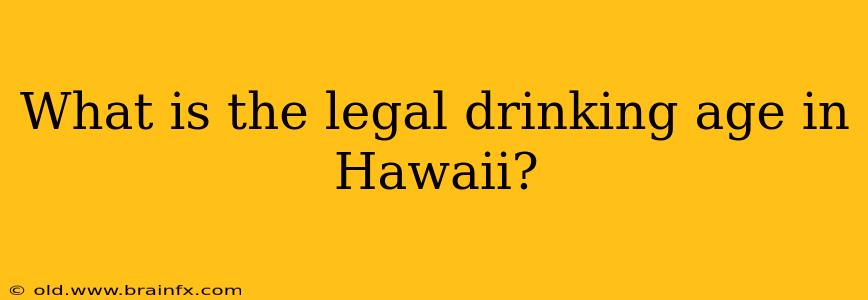Hawaii, like most U.S. states, maintains a minimum legal drinking age (MLDA) to protect public health and safety. This age dictates when individuals are legally permitted to purchase, possess, and consume alcoholic beverages. So, what is the legal drinking age in Hawaii?
The Minimum Legal Drinking Age in Hawaii is 21
The minimum legal drinking age in Hawaii is 21 years old. This means that individuals must be at least 21 years of age to legally purchase, possess, or consume alcohol. This law is strictly enforced, and violations can result in significant penalties.
Understanding the Implications of the 21-Year-Old Law
This age restriction isn't arbitrary; it's based on a comprehensive understanding of brain development and the potential risks associated with underage drinking. The brain continues to develop well into the early twenties, and early alcohol exposure can have long-term negative consequences:
- Impaired Brain Development: Alcohol consumption during adolescence can interfere with brain development, potentially impacting cognitive functions, memory, and learning abilities.
- Increased Risk of Alcohol Dependence: Early alcohol use significantly increases the risk of developing alcohol dependence and other substance abuse disorders later in life.
- Higher Risk of Accidents and Injuries: Underage drinking is a leading contributing factor to accidents, injuries, and fatalities, particularly those involving motor vehicles.
Penalties for Underage Drinking in Hawaii
The consequences of violating Hawaii's MLDA are severe and can include:
- Fines: Significant monetary penalties can be imposed on individuals found to be in possession of alcohol underage.
- Community Service: Court-ordered community service may be required as part of the sentence.
- License Suspension: Driving privileges can be suspended or revoked for underage drinking-related offenses.
- Criminal Charges: In more serious cases, individuals could face criminal charges, potentially leading to jail time.
Exceptions and Clarifications
While the legal drinking age is 21, there are some limited exceptions:
- Religious Ceremonies: Consumption of alcohol may be permitted in certain religious contexts, though this is strictly regulated and requires specific circumstances.
- Parental Consent: In limited circumstances, and with explicit parental consent, minors may be able to consume alcohol under extremely controlled environments. However, this is not common and should be approached with caution, adhering to all applicable local regulations.
It's crucial to understand that these exceptions are narrow and do not negate the fundamental 21-year-old rule. The presumption remains that alcohol consumption by individuals under 21 is prohibited.
Staying Informed and Responsible
Hawaii's 21-year-old MLDA is a critical public health measure. Staying informed about the laws and the potential consequences of underage drinking is essential. If you have questions or concerns, consulting legal resources or contacting local authorities is advisable. Responsible behavior regarding alcohol is crucial for both personal well-being and the safety of the community.
Disclaimer: This information is for educational purposes only and should not be considered legal advice. For specific legal guidance, please consult a legal professional.

